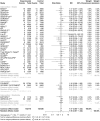Lipid-Lowering Therapy and Risk of Hemorrhagic Stroke: A Systematic Review and Meta-Analysis of Randomized Controlled Trials
- PMID: 38323514
- PMCID: PMC11010101
- DOI: 10.1161/JAHA.123.030714
Lipid-Lowering Therapy and Risk of Hemorrhagic Stroke: A Systematic Review and Meta-Analysis of Randomized Controlled Trials
Abstract
Background: There is debate over whether statins increase risk of hemorrhagic stroke, so we assessed current evidence, including data from new statin trials and trials of nonstatin low-density lipoprotein-cholesterol (LDL-C)- and triglyceride-lowering therapies.
Methods and results: We performed a systematic review of large randomized clinical trials (≥1000 patients with ≥2 years follow-up) of LDL-C-lowering therapy (statin, ezetimibe, and PCSK-9 [proprotein convertase subtilisin/kexin type 9] inhibitor) and triglyceride-lowering therapy (omega-3 supplements and fibrate) that reported hemorrhagic stroke as an outcome. We searched MEDLINE, Embase, and Cochrane Library up to July 2, 2021 and updated a meta-analysis of cardiovascular statin trials published in 2012. Among our several subgroup analyses, we looked at difference depending on stroke status and also depending on age. We identified 37 trials for LDL-C lowering (284 301 participants) and 11 for triglyceride lowering (120 984 participants). Overall, we found a higher risk of hemorrhagic stroke for LDL-C lowering, risk ratio (RR) 1.16 (95% CI, 1.01-1.32, P=0.03). For statins (33 trials, 216 258 participants), RR=1.17 (95% CI, 1.01-1.36); for PCSK-9 inhibitors (2 trials, 46 488 participants), RR=0.86 (95% CI, 0.43-1.74); and for ezetimibe (2 trials, 21 555 participants), RR=1.14 (95% CI, 0.64-2.03). In statin trials of patients with previous stroke/transient ischemic attack, RR was 1.46 (95% CI, 1.05-2.04), and in trials with mean age ≥65 years old, RR=1.34 (95% CI, 1.04-1.73) (Pint=0.14 and Pint=0.23 respectively); for triglyceride lowering (11 trials, 120 984 participants), RR=1.05 (95% CI, 0.86-1.30).
Conclusions: We found evidence for a small increased risk of hemorrhagic stroke events with LDL-C-lowering therapies but no clear evidence for triglyceride-lowering therapies.
Registration: URL: https://www.crd.york.ac.uk/prospero; Unique identifier: CRD42021275363.
Keywords: hemorrhagic stroke; intracerebral hemorrhage; lipid‐lowering therapy; nonstatin; statin.
Figures



Comment in
-
Lipid-Lowering Therapy and Hemorrhagic Stroke: A Never-Ending Debate of Clinical Implications. Have We Found the Answer?J Am Heart Assoc. 2024 Feb 20;13(4):e034099. doi: 10.1161/JAHA.124.034099. Epub 2024 Feb 7. J Am Heart Assoc. 2024. PMID: 38323520 Free PMC article. No abstract available.
References
-
- Mach F, Ray KK, Wiklund O, Corsini A, Catapano AL, Bruckert E, De Backer G, Hegele RA, Hovingh GK, Jacobson TA, et al. Adverse effects of statin therapy: perception vs. the evidence–focus on glucose homeostasis, cognitive, renal and hepatic function, haemorrhagic stroke and cataract. Eur Heart J. 2018;39:2526–2539. doi: 10.1093/eurheartj/ehy182 - DOI - PMC - PubMed
-
- Shepherd JC, Ford I, Isles CG, Lorimer AR, MacFarlane PW, McKillop JH, Packard CJ. Randomised trial of cholesterol lowering in 4444 patients with coronary heart disease: the Scandinavian Simvastatin Survival Study (4S). Lancet. 1994;344:1383–1389. - PubMed
-
- de Lemos JA, Blazing MA, Wiviott SD, Lewis EF, Fox KA, White HD, Rouleau JL, Pedersen TR, Gardner LH, Mukherjee R, et al. Early intensive vs a delayed conservative simvastatin strategy in patients with acute coronary syndromes: phase Z of the A to Z trial. JAMA. 2004;292:1307–1316. doi: 10.1001/jama.292.11.1307 - DOI - PubMed
-
- Downs JR, Clearfield M, Weis S, Whitney E, Shapiro DR, Beere PA, Langendorfer A, Stein EA, Kruyer W, Gotto AM Jr. Primary prevention of acute coronary events with lovastatin in men and women with average cholesterol levels: results of AFCAPS/TexCAPS. Air Force/Texas Coronary Atherosclerosis Prevention Study. JAMA. 1998;279:1615–1622. doi: 10.1001/jama.279.20.1615 - DOI - PubMed
Publication types
MeSH terms
Substances
LinkOut - more resources
Full Text Sources
Medical
Miscellaneous

